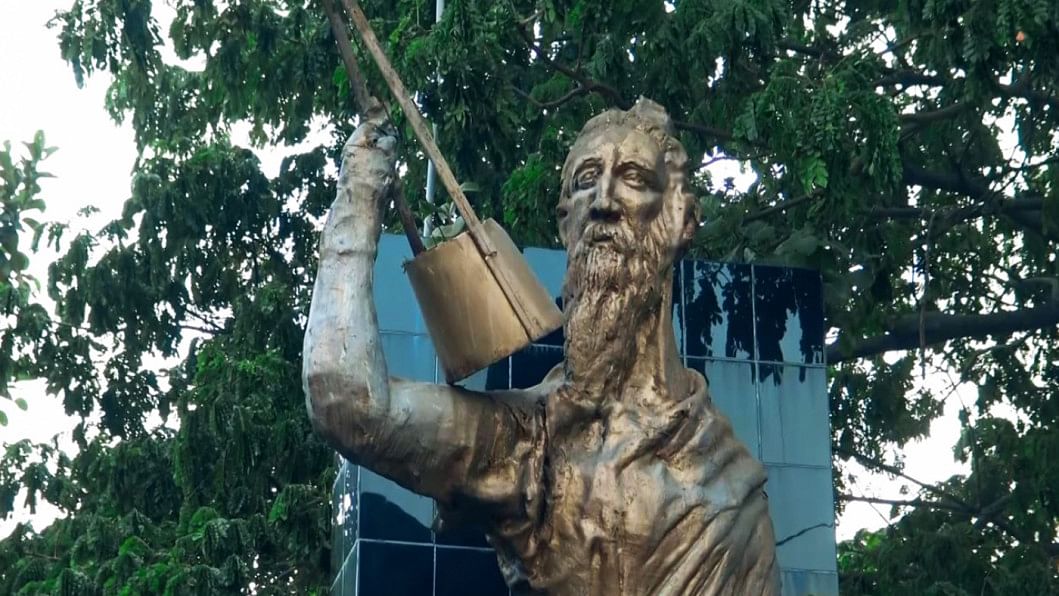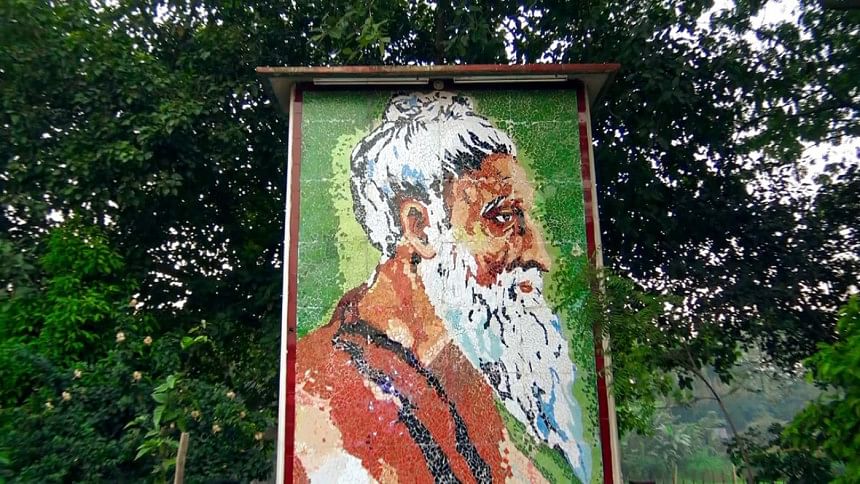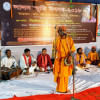Lalon Shai, the guru of humanity

"Sohojiya Sadhana" or the simplistic pursuit springs forth from the heart. This took up speed in the middle ages. The Indian subcontinent was the venue for mega convergence of it. The sadhaks of the Great India showed the paths of Gyanayoga, Bhaktiyoga, Karmayoga and many more. Here we see a unique convergence of power, knowledge, devotion and work.
Bangladesh too is not out of this mega convergence of forces. After post Chaitannya era some small religious sects came into existence here. Aaul, Baul, Shai, Darbesh, Kortabhoja and Sohojiya are considered the main sections of such spiritual growth.
Within the philosophic flow of Nadia, Fakir Lalon Shai's spiritual songs and inner pursuits from the Baul tradition came to hold an influential position. Although back then the depth and worth of his spiritual knowledge could not be estimated, the verses of his songs containing essential knowledge summoned love and respect of people. In this line, his followers and devotees are gradually increasing. Many are being influenced to take up the Baul lifestyle being inspired by this sadhak. They are now the heartbeat of the Lalon Akhra of Kumarkhali's Cheuria in Kushtia.
However, this torch bearer of folk of Bangla Literature was a man who grew up in rural society. From there the upheaval he brought about within humanity through his pursuit and realizations is truly astounding.
Although the real worth of his social thoughts, love for humanity and humane sense is neglected, the scientific minded dynamic citizens of the civilised world are bowing in respect in front of Lalon's philosophy. People from all around the globe, even from remote corners, are coming to know and follow the philosophy of this spiritual seeker.
In a rural setting, how Lalon came to organise a section of society is really unprecedented. Inspired by his simplistic thoughts people gather at his akhra in the month of Falgun and Chaitra during Dola Purnima and in the month of Kartik during festivity organised in commemoration of his death.

Lalon's 21 songs including 'Khachar Bhetor Ochin Pakhi' first got its printed form through his disciple and companion Kangal Harinath's MN press. We also came to know Rabindranath Tagore as one of the main collector of Lalon Shai's songs. Rabindranath alone collected more than one hundred of his songs. He published twenty of Lalon's songs in "Harmony" section of the "Probashi" magazine. It is needless to say that Kabiguru was bemused after listening to Shai ji's songs.
Therefore, being submerged in Lalon's thoughts and ideas he realised that his philosophy is everlasting. They are a source of the flow of eternal knowledge. That's why it was Rabindranath himself who for the first time brought Lalon in front of the world stage. By translating "Khachar Bhetor" Rabindranath brought this great philosopher in front of the world. As a result, surpassing the national stage this singer, pursuer and philosopher becomes visible worldwide. Gradually, Lalon became the center of attraction for the whole world. Now, there are researches are being conducted on his songs.
To see humans as humans by not ensnaring humanity in the shackles of division, he taught humans to adore each others as gurus. Here lies the eternal spring of love which leads to human freedom. He saw humans as avatars. He said without acquiring the divine knowledge none would know this. This Knowledge is hidden in adoring humans and caring for humans. Because the formless divine assumes form in humans, as explained by Shai Ji like this,
One who treats man as his teacher-
In world all people treat him as teacher.
One who as formless-glows it so appear.
When he attains form, he becomes more clear.
When the eyes turn divine then you're aware-
That in modern age the man is God's avatar.
('সর্বসাধন সিদ্ধ হয় তার/মানুষ গুরু নিষ্ঠা যার/নদী কিংবা বিল বাঁওড় খাল/সর্বস্থলে একই একজন.../দিব্যজ্ঞানী হয় তবে জানতে পায়/কলিযুগে হলেন মানুষ অবতার'।)
Another characteristic of Lalon Shai's songs is that usually at the end of his songs he uses his own name in the lyrics. As a result none will be able to plagiarise his song. As example he used his name at the final phase of one of his most popular songs-'The whole world talks about Faith, everyone displaying their pride!Lalon says, 'My Faith has capsized in this Market of Desire.' [Translated by Sudipto Chatterjee]
('জগত বেড়ে জাতের কথা,/লোকে গৌরব করে যথা তথা/লালন সে জাতের ফাতা ঘুচিয়াছে সাধ বাজারে/সব লোকে কয় লালন কী জাত সংসারে'।)
Lalon has presented many logic, explanation and subtle yet effective analogies on existence, physiology, psychology, social division. He clearly used to believe that the divine can be found only within the creations. That's why the eternal verse of Chandidas, where he celebrates humanity saying: 'সবার উপরে মানুষ সত্য/তাহার উপরে নাই', gets established through his songs. He never wanted to be confined within the shallowness of caste and creed. He used to believe that this limitations surrounding class, caste and creed make keeps humans divided, ineffective and incapsulated. Such pronouncement are refelcted clearly and intensely in this song:
"Can't reach God if don't reject cast/ Why should I praise cast/ Saying don't touch/ Lalon says if i could reach it/ I would have burnt it in fire"
('জাত না গেলে পাইনে হরি/কিছার জাতের গৌরব করি/ছুঁসনে বলিয়ে/লালন কয় জাত হাতে পেলে/পুড়াতাম আগুন দিয়ে'।)
Through his songs he used to express such intense assertions on caste and division. This also shows how much tormented he was due to Hindu-Muslim dispute of the time.
The way Religious consciousness gave refuge to the mystic sadhaks of the middle ages Lalon was one of them. But Lalon sought the path to freedom out of the religious limitations and confinement. In his voice, humanity and the religion of the human got most expressive lyrical representations.
This icon of human religion, love for humanity and the architect of non-communal line of thought, Lalon Shai not only fought for the freedom of human soul but also revealed the core of his sadhana that is "knowing thyself". Soul resides within the body. Even after sensing this truth none can touch or see the soul. Lalon expressed these ideas through his song, 'I have not seen her even once/my neighbor who lives in the city of mirrors near my house'.
[Translated by: Carol Salomon, Senior Lecturer in the Department of Asian Studies at the University of Washington]
('বাড়ির কাছে আরশিনগর সেথা/এক পড়শি বসত করে/আমি একদিন না দেখিলাম তারে'।)
Internalising this very essential knowledge Rabindranath later composed,
"Suddenly the window of my heart flew open this morning, the window that looks out on your heart."
('আমার হিয়ার মাঝে লুকিয়ে ছিলে/দেখতে আমি পাইনি/বাহির পানে চোখ মেলেছি/হৃদয় পানে চাইনি'।)
and
"The man of my heart dwells within,
And so I find him everywhere."
('আমার প্রাণের মানুষ আছে প্রাণে/তাই হেরি তায় সকলখানে'।)
The mystic world Lalon built through his spiritual consciousness and richness has not waned even a bit after his leaving the human life more than a century ago. Just like 'Charyapada', the essence of his songs have guided humanity towards equanimity and non-communalism. His songs are the salient principles that empowers the fight against division and communalism. The philosophy of Lalon teaches us to be logical and realistic being free from the bondage of religious extremism.
Someday, I hope, this philosophy will spread even more far and wide to expel the darkness of ignorance and to sprout the soul of world humanity and the conscience of equality.
Translated by: Mahdi Hasan

 For all latest news, follow The Daily Star's Google News channel.
For all latest news, follow The Daily Star's Google News channel. 








Comments